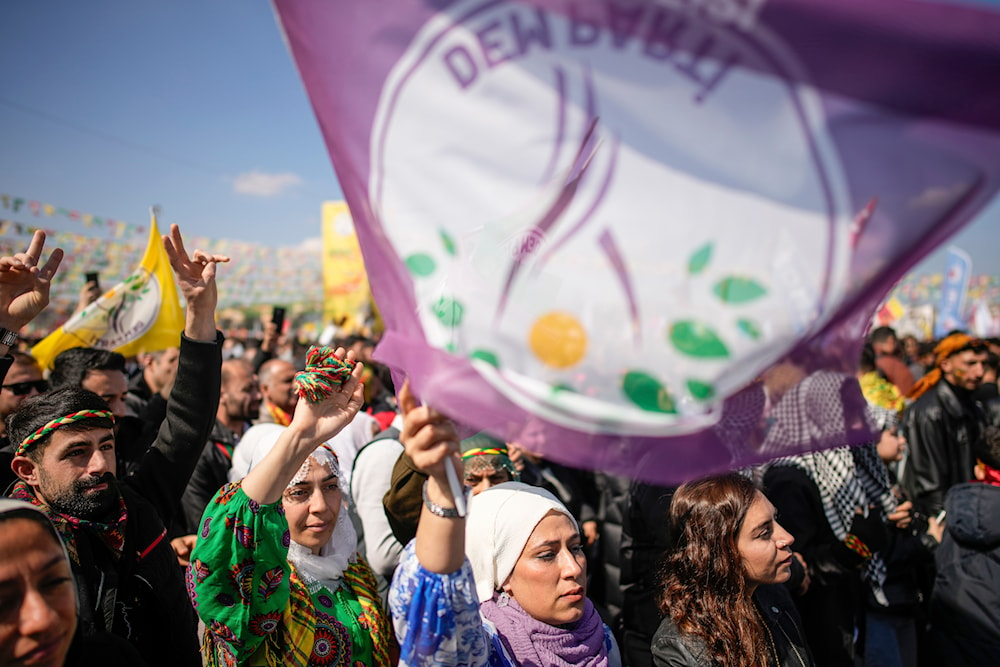Allegiance or CHP: How will Turkey's Kurds vote in local elections?
Turkey's Kurds are evenly split between showing their community's strength in local elections or defeating the ruling AKP in Istanbul, polls reveal.
-

Supporters of the Peoples' Equality and Democracy Party (DEM) gather to celebrate Newroz festivity, marking the start of spring, in Istanbul, Turkey, on March 17, 2024. (AP)
Turkey's Kurds will put aside party loyalty to back the leading opposition Republican People's Party (CHP) candidate in Greater Istanbul, a major rival of Recep Tayyip Erdogan's Justice and Development Party (AKP), Reuters reported, citing pollsters.
The Kurdish minority in Turkey played a crucial role in securing CHP's victory in the last municipal elections in 2019, ending AKP's leadership in the major Turkish city.
Turkey's Kurds are majorly aligned with the Peoples' Equality and Democracy Party (DEM), which has formed a strategic alliance with CHP over the past years. The victory of the current Mayor and CHP candidate for the mayoral election in Greater Istanbul, Ekrem Imamoglu in 2019 is one pivotal example of how the alliance worked to weaken AKP in Turkish local elections.
However, the most recent presidential and legislative elections in Turkey dealt a mighty blow to the hopes of the opposition, after Erdogan secured both the presidency and the majority in parliament. Polls show that Imamoglu and his AKP rival, Murat Kurum, are closely contesting the mayoral seat this time around, while DEM candidate Meral Danis Bestas trails behind both.
Bestas has rejected claims that party members will engage in "tactical voting" to secure Kurum's seat, saying that DEM's strategy focuses on garnering voter support for her candidacy.
On the other hand, polls tell a completely different story. According to Yuksel Genc, a pollster at SAMER, 40% of DEM supporters had indicated that they would vote for CHP candidate and current Mayor of Istanbul, Imamoglu.
"They (Turkey's Kurds) are confused and undecided. They are considering voting for their party candidate but don't want the AK Party to win," Reuters said, quoting Genc.
The Turkish government has had a major rivalry with Kurdish parties, specifically the Kurdistan Worker's Party (PKK). Another major Kurdish majority movement, the Peoples' Democratic Party (HDP), has also faced troubles with Turkish authorities over alleged ties to militants, facing closure.
DEM has succeeded HDP as Turkey's leading pro-Kurdish movement, securing around 10% of the seats in Turkey's latest parliamentary election.
Read more: Turkey destroys 29 PKK targets in Iraq, Syria air operations: Ministry
Kurds undecided about a show of strength or tactical victory
Following failed negotiations between Erdogan's government and the PKK in 2015 to end the party's insurgency, Turkish authorities launched a campaign against pro-Kurdish parties, including the HDP, whose leaders and members were ravaged by arrests and mayors were ousted.
Diyarbakir, the southeast, and state-appointed trustees
DEM remains dominant in the southeast's largest city Diyarbakir. Voters there believe that it is necessary to vote for DEM.
DEM and Bestas in Istanbul also insist on the necessity of retaining their party members' votes in the upcoming elections on March 31.
"Our call is for people to vote for us. I believe every party has a fundamental duty to conduct its own politics," Bestas said in an interview.
The majority of DEM's voters have echoed Bestas' calls according to polls, seeking a show of strength against the most recent crackdown, which saw state-appointed trustees replace Kurdish mayors in the southeast.
"A Turkey where a quarter of the population is marginalized and discriminated against, and whose demands are not met cannot be democratic," Bestast said in relation to the current status quo in Turkish politics.
Read more: Turkish Defense Minister: 'Joint US-PKK' drills unacceptable

 4 Min Read
4 Min Read








